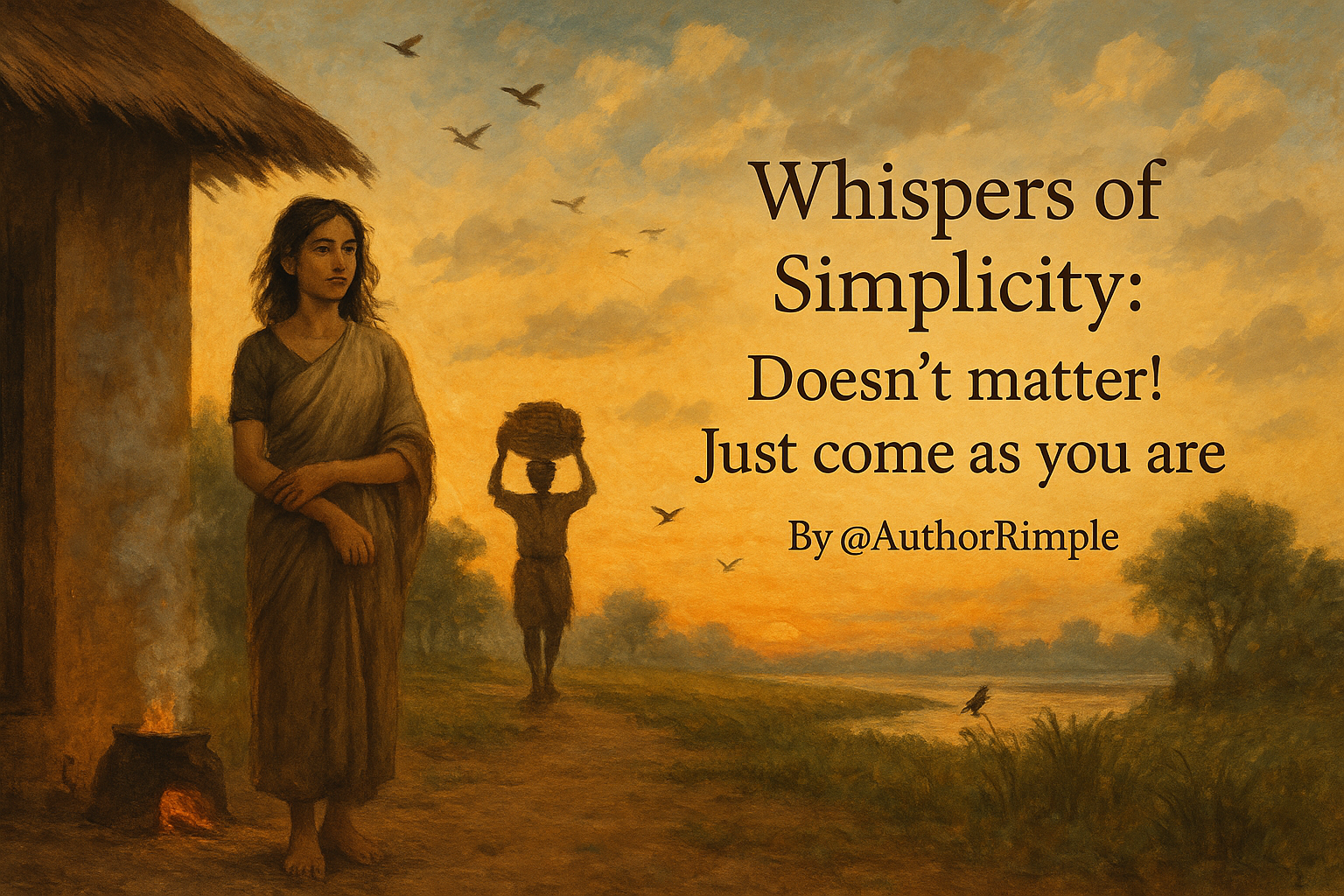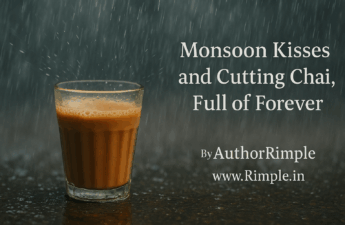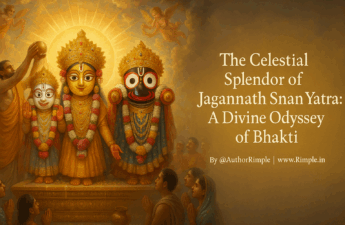In a world lit by the soft flicker of oil lamps, where electricity was a distant dream, Jaisi Ho Vaisi Hi Aa Jao from Gulzar in Conversation with Tagore emerges like a gentle breeze carrying the scent of earth and longing. Crafted by Gulzar, inspired by the poetic spirit of Rabindranath Tagore, this song is a delicate ode to love’s purest form—unadorned, unguarded, and utterly human. Sung with a tender lilt, it paints a rustic tableau of a woman preparing for her beloved, her heart caught between anticipation and the beauty of being herself. Its central theme is a celebration of authenticity, where love cherishes the soul over superficial adornments, set against a backdrop of village simplicity and nature’s embrace. This prose weaves the song’s poetry into a tapestry of emotions, inviting every reader to feel its warmth, its innocence, and its timeless grace.
A Rustic Canvas of Dreams
Imagine a village at dusk, where the sky blushes with the last hues of day, and the air hums with the rhythm of life untouched by modernity. The song opens with a whimsical prelude—a rustic man, a dihati, crossing a sunlit field, a bundle of jaggery atop his head. As the sun climbs, the jaggery melts, sweet droplets falling to his forehead, and he, in innocent wonder, licks them with his tongue, marveling at the poetry of Tagore that seems to have sweetened his simple world. This image sets the tone: a world where the ordinary becomes magical, where life’s small moments—melting jaggery, a buzzing bee—carry the weight of poetry. Gulzar’s words, infused with Tagore’s spirit, transform the mundane into a canvas of wonder, inviting us to see beauty in the unpolished.
The song shifts to a woman’s heart, poised at the hearth of her home, where a fire crackles and smoke stings her eyes. “Saanjhya puja ho jaye” (“Let the evening prayers be done”), she murmurs, her thoughts on her beloved, who is near, perhaps just beyond the horizon. The setting is humble—a clay hearth, a lamp’s trembling flame, the scent of earth after rain. Yet, it’s alive with emotion: the sting of smoke, the thrill of waiting, the quiet joy of knowing he’s coming. This is no grand stage but a village home, where love is woven into daily rituals, where anticipation is as sacred as prayer. The song’s beauty lies in its rootedness, its ability to make a simple hearth feel like a temple of longing.
The Heart’s Gentle Plea
At its core, Jaisi Ho Vaisi Hi Aa Jao is a lover’s tender call, spoken through the voice of a man who sees beyond the surface. “Jaisi ho vaisi hi aa jao, singaar ko rehne do” (“Come as you are, let adornments be”). These words are a melody of acceptance, a vow that loves her essence, not her embellishments. The refrain is like a heartbeat, steady and warm, urging her to step forward without fear of imperfection. Her hair may be tousled, her maang (parting) uncombed, her blouse’s laces untied—“to bhi koi baat nahi” (“it doesn’t matter”). The simplicity of these lines is their power; they strip away the need for pretense, celebrating her as she is, raw and real.
The imagery is vivid, earthy, and alive. Her feet, kissed by dew-soaked soil, may falter, her anklet’s bells may fall—yet, he insists, it’s no matter. The village around them breathes with life: clouds gather in the sky, birds rise from the riverbank, their wings a chorus of freedom. Nature mirrors her heart—untamed, vibrant, unadorned. The singaar diya (lamp of adornment), lit in hope, flickers in the breeze, its flame trembling like her nervous anticipation. Gulzar’s poetry, inspired by Tagore, paints her not as a polished ideal but as a daughter of the earth, her beauty in her flaws, her grace in her unguarded moments.
The song’s tenderness deepens as it acknowledges her unspoken worries. “Kisko pata hai palkon tale, diya ka kaajal laga nahi” (“Who knows if kohl lines your eyes?”). Her lashes may lack kohl, her braid may miss its jasmine garland—“to chhodo” (“let it be”). These lines are a lover’s reassurance, a whisper that her imperfections are cherished, that her presence is enough. The absence of adornments—kohl, garlands, ribbons—becomes a symbol of her authenticity, a rejection of the world’s demand for polished perfection. In a time when women lit lamps to adorn themselves, this song redefines beauty, placing it in the heart’s quiet truth.
A Love Beyond the Mirror
The song’s central theme is a love that transcends appearances, rooted in the simplicity of rural life and the wisdom of Tagore’s philosophy. It speaks to a time before electricity, when lamps cast soft shadows and women adorned themselves with nature’s gifts—dewdrops, earth, the glow of anticipation. Yet, the beloved’s voice insists that these adornments are secondary; her true singaar is her soul, her courage to be herself. This is a love that doesn’t demand—she need not rush to perfect her appearance, need not hide her natural state. It’s a love that waits, patient and kind, like the river that flows beyond their village, steady in its course.
The poetry is playful yet profound, teasing her gently for her worries while lifting her up. The repetition of “to bhi koi baat nahi” (it doesn’t matter, just let the adornments be) is like a smile, a reassurance that her fears are small in the face of his devotion. The imagery of clouds, birds, and trembling lamps weaves nature into their story, suggesting that their love is as organic as the world around them. Gulzar’s words carry Tagore’s spirit—his belief in the beauty of the human spirit, unadorned and free. The song feels like a conversation across time, where Gulzar channels Tagore’s reverence for simplicity, crafting a love song that feels eternal.
The woman, though unnamed, is every woman—her heart racing as she prepares for her beloved, her hands pausing over unfinished tasks. She’s not a distant ideal but a living, breathing soul, her breath quickening as she imagines his arrival. The song invites us to see her—to feel the dew on her feet, the smoke in her eyes, the flutter of her heart. It’s a universal story, one that resonates with anyone who has ever felt the nervous joy of being seen, truly seen, by someone they love. The innocence lies in its purity—no trace of lust or possession, just a call to be authentic, to step into love as one is.
A Glow That Endures
The beauty of Jaisi Ho Vaisi Hi Aa Jao, singaar ko rehne do (Come just as you are, let the adornments be) is its ability to make the ordinary sacred. The village setting—its hearth, its river, its flickering lamps—becomes a stage for a love that needs no grandeur. The melody, soft and folk-like, feels like a lullaby, carrying the listener to a time when life was slower, when love was a quiet promise rather than a loud declaration. Gulzar’s lyrics, steeped in Tagore’s reverence for the human spirit, are simple yet profound, each word a brushstroke on a canvas of longing and acceptance.
The song’s playfulness sparkles in its gentle teasing—her worry over uncombed hair, his insistence that it doesn’t matter. Its lyrical grace lies in its imagery: dewy earth, trembling flames, birds taking flight. Its innocence is its heart—a love that cherishes flaws, that sees beauty in the undone, the unpolished. The cultural depth, rooted in a pre-electric era, reminds us of a time when adornments were simple, when love was a meeting of souls, not surfaces. Every listener can feel the woman’s anticipation, the man’s devotion, the village’s quiet pulse, as if we, too, are waiting by the hearth, lamp in hand.
The Fading Light of Today’s Songs
In contrast, today’s music often feels like a blaze—bright but fleeting, loud but hollow. Where Jaisi Ho Vaisi Hi Aa Jao glows with innocence, modern songs chase spectacle, trading depth for flash. Lyrics lean on excess—lust, materialism, fleeting thrills—reducing love to a transaction, beauty to a checklist of polished surfaces. Music videos flaunt skin and wealth, leaving no room for the heart’s quiet truths. Respect is often an afterthought, with women portrayed as objects, not souls, far from the reverence of this song’s beloved. The poetry of simplicity, the tenderness of acceptance, the grace of authenticity—these are drowned in beats that demand attention but offer little meaning. Innocence, once a lamp’s soft glow, is now a flicker, lost to a world that prizes gloss over grace. Songs like this are rare now, their light a reminder of what love can be when it dares to be simple.
This song is a whisper from a village dusk, a call to love without pretense, to find beauty in the undone. It lingers like the scent of earth after rain, inviting us to step forward, as we are, into the arms of those who see us truly. Its glow is eternal, a testament to the poetry of being human.
Also Read:





